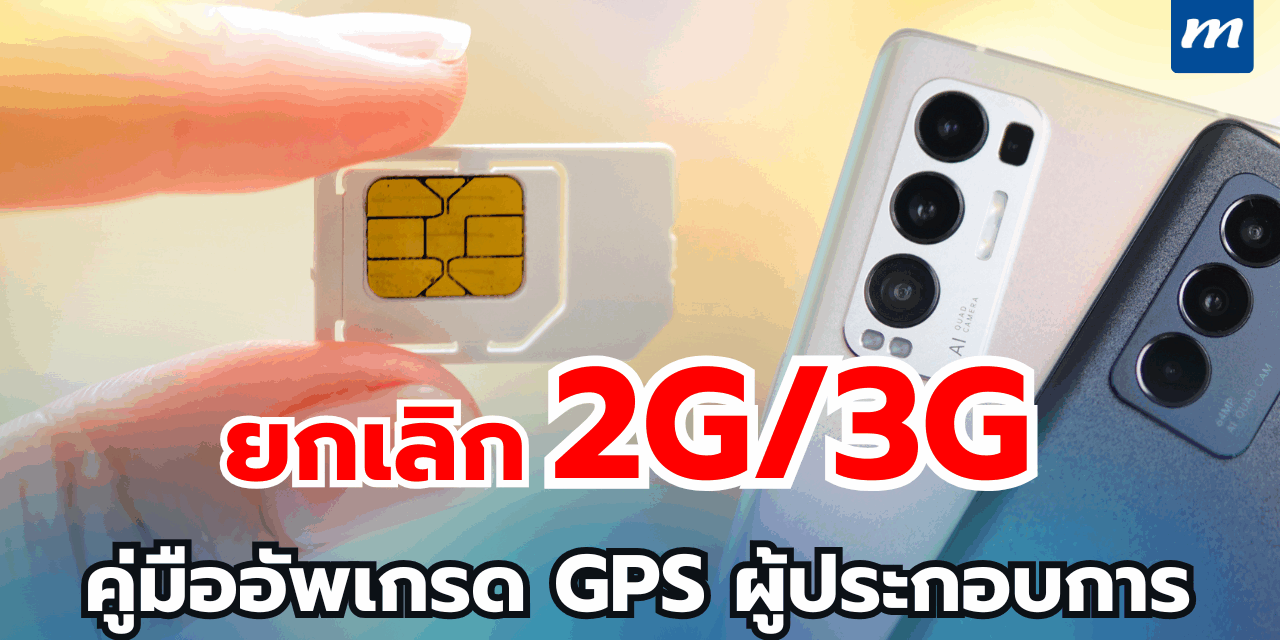2G/3G Shutdown GPS Upgrade Guide for Business Operators
The Thai government has announced a policy to phase out the use of devices that support 2G and 3G networks within the next 1-3 years. This policy directly impacts operators using older GPS tracking models, particularly in trucks, freight transport vehicles, and commercial fleets that still rely on legacy devices.
The key question is : What will happen if older GPS models are no longer supported?
This article serves as a guide for business owners and drivers to understand the impacts, learn how to check their devices, and explore upgrade solutions to be fully prepared before the actual phase-out takes effect.
1. Why is 2G/3G being phased out?
-
-
- Inefficient use of spectrum: Network providers want to reallocate frequencies to 4G/5G, which can support a much larger number of users.
- Speed limitations: 2G/3G networks transmit data slowly and cannot meet the needs of modern IoT and GPS tracking systems that require real-time performance.
- Global policy: Many countries, such as Singapore, Australia, and the United States, have already phased out 2G/3G to modernize their communication networks.
-
Who Will Be Affected?
-
-
- Transportation operators using older GPS devices: These units will no longer be able to transmit data to the system.
- Commercial trucks required to comply with the Department of Land Transport (DLT) regulations: They risk fines if their GPS devices are not online.
- Companies with large fleets: They must plan upgrades in advance; otherwise, their business operations may be disrupted.
-
3. How to Check if Your GPS Device Uses 2G/3G
-
-
- Ask your GPS provider: Contact the seller or service center.
- Check the device specifications: Most models released before 2019 still rely on 2G/3G.
- Observe usage: If the signal frequently drops, updates are slow, or the connection is unstable, it is highly likely that the device is an older model.
-
4. Consequences of Not Upgrading
-
-
- GPS cannot transmit data to the platform: Trucks will fail inspections by the Department of Land Transport (DLT).
- Risk of legal penalties and possible inability to renew the transport operating license.
- Loss of cost control, such as the ability to monitor routes, speed, and driver working hours.
- Lack of crucial evidence in the event of accidents or legal disputes.
-
5. GPS Upgrade Guidelines
-
-
- Upgrade to models supporting 4G or higher: For better stability and future readiness for 5G.
- Choose DLT-certified devices: To ensure legal compliance.
- Choose systems with software upgrade capability: To support new functions such as MDVR, TMS, and event filtering.
-
6. Upgrade Costs
-
-
- Replacing with a new device: Approximately 3,000-6,500 THB per unit (depending on service and installation).
- Monthly service fee (SIM + platform): 200-350 THB per vehicle per month.
- Alternative: Some companies (such as MonoGPS) offer existing customers the option to pay only a portion of the cost to reduce their financial burden.
-
7. Case Studies
-
-
- Representative customers (vehicle inspection centers): Most have already switched to newer GPS models, so the impact is minimal.
- Corporate clients managed directly by MonoGPS: There are still several thousand vehicles using 2G/3G that require a phased upgrade plan.
-
8. Recommendations for Business Operators
-
-
- Start checking immediately which GPS model each vehicle is using.
- Plan the budget in advance, especially for large fleets.
- Choose models that are durable and future-ready, so they don’t need frequent replacement.
- Choose models that are durable and future-ready, so they don’t need frequent replacement.
-
9. Why Upgrade with MonoGPS
-
-
- Offers new 4G/5G-compatible devices certified by the Department of Land Transport (DLT).
- End-to-end installation and maintenance services provided by the company’s own technical team.
- Consultation services for planning fleet-wide upgrades.
- Additional products available, such as MDVR, Rack Tracking, and TMS, that can be seamlessly integrated.
-
The phase-out of 2G/3G is inevitable and will take place within the next 1-3 years. Upgrading GPS tracking systems is therefore not only about legal compliance, but also an investment in safety, cost reduction, and improved efficiency for transport businesses. If you are a vehicle owner or operator looking to upgrade your GPS, MonoGPS is ready to help you plan and manage the process professionally.

